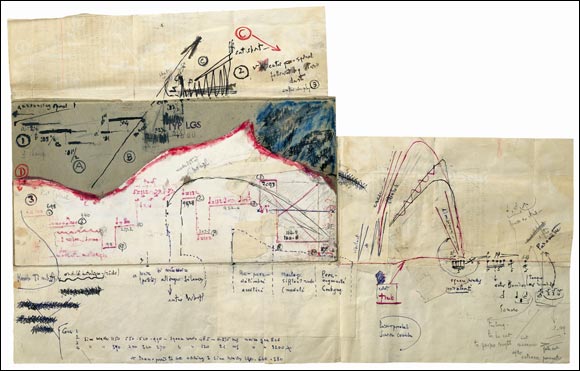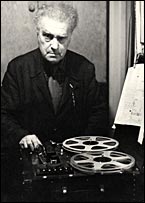For years Edgar Varèse was considered an isolated maverick on the contemporary music scene. He did achieve final recognition as such leading postwar avant-garde figures as Pierre Boulez and John Cage discovered his music and drew on his achievements. By the time of his death, on November 6, 1965, he was regaled with honors and awards. He left behind a small but impressive body of works that has challenged artists and scholars time and again in the forty years since his death to come to grips with his art. The Paul Sacher Foundation - an international center for documentation and research on contemporary music – was able to acquire Varèse‘s archives. This joint exhibition, mounted with the Museum Tinguely, which adds to these exceptional documents paintings, drawings, and musical instruments on loan from international collections, offers to the public the first comprehensive glance at the legacy of this path-breaking twentieth-century composer.
A revolutionary creator of new sounds
Edgard Varèse was born in Paris on December 22, 1883. The son of an engineer, he developed a close affinity to the natural sciences from early childhood. Instead of taking up a technical profession, however, he soon turned entirely to music, first in Paris and Berlin, and then in the United States where he emigrated in 1915. A natural crossover figure, he drew inspiration from talking to leading physicists and acoustical engineers and befriending such artists and writers as Antonin Artaud, Alexander Calder, Marcel Duchamp, Le Corbusier, Henry Miller, Joan Miró, Francis Picabia, Man Ray, and Joseph Stella. Again and again he made ever-new attempts to probe the musical potential of scientific concepts and the visual and spatial perception of modern art. I need an entirely new medium of expression: a sound-producing machine, not a sound-reproducing one. Varèse's primary concern was not the reproduction of music. He saw himself as a revolutionary creator of new sounds, preferred the term "organized sound" to "music," and far transcended the bounds of conventional orchestral instruments in his quest for new timbres. He was particularly interested in the use of machines to generate music. He was already probing the possibilities of electronic sound production in the late Twenties.
Varèse's life and music
The exhibition is divided into eight sections: "Imprintings - Points of Orientation", "Conductor and Initiator in New York", "Probing Uncharted Compositional Territory ", "A Pan-American in Paris", "Approaching Electronics", " "Against the Currents of the Day", "Contacts with the Post-War Avantgarde", and "Posthumous Impact and Reception".These sections cover, in roughly chronological order, the important way-stations in Varèse's life and music, as well as his artistic roots and subsequent impact. The main focus falls on his musical manuscripts, textual manuscripts, correspondence, and other documents from his estate. They are accompanied by many items on loan from international museums and private collections, including paintings, drawings, sculpture, and musical instruments, to illustrate his contacts with visual artists and his interest in new forms of sound production. In "Approaching Electronics", Varèse's Poème électronique is presented alongside a reconstruction of the series of pictures conceived by Le Corbusier. Augmenting the items on display are twelve "listening stations" with samples of Varèse's music spread throughout the exhibition, as well as several monitors with films on Varèse and his artistic milieu.
At the same time as the Varèse exhibition, the museum will display selected sound reliefs and noise machines by the ingenious "meta-mechanician" Jean Tinguely. Also on display will be the sound installation instant city (2003-6), conceived by Sybille Hauert and Daniel Reichmuth in collaboration with Volker Böhm.
Around the exhibition
Alongside the exhibition, a program of concerts includes Varèse's well-known octet Octandre (1923) as well as epoch-making Ionisation for thirteen percussionists (1931) and Déserts (1949-54), Varèse's last large-scale work, one of the earliest compositions to make use of taped sounds combined with sounds from conventional instruments The film Déserts, by the video artist Bill Viola, will be screened along with Varèse's composition. Another special occasion is the exhibition's closing event, when the Theremin virtuoso Lydia Kavina will demonstrate her unusual electronic instrument and perform Varèse's Density 21.5 for unaccompanied flute.
Illustration: Roy Hyrkin (b. 1927) Varèse listening to tape recordings (October 1959), Photograph Paul Sacher Foundation Basel (Edgard Varèse collection) Photo: Roy Hyrkin
PUBLICATION
Exhibition catalogue in English, with detailed descriptions of the exhibition’s pièces, 32 musicologicals essays, and testimonies by important contemporary composers, 508 pages, 250 mainly colour illustrations. Boydell & Brewer, Melton, Suffolk. Price: CHF 59 - / £ 25. (Bookshops price £ 29)
To see more illustrations, click on VERSION FRANCAISE at the top of this page
|



